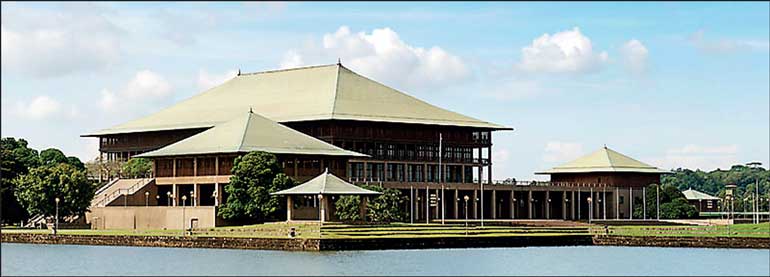Sunday Feb 15, 2026
Sunday Feb 15, 2026
Wednesday, 20 April 2022 00:00 - - {{hitsCtrl.values.hits}}

The media has recently reported of a proposal to amend the Sri Lankan Constitution to provide for an interim Cabinet with a limited number of Cabinet Ministers with proven merit in the subject-matters they are to be empowered to deal with.
are to be empowered to deal with.
The proposal stems from an attempt to accommodate the interests of a group of politicians and members from all walks of public life who have been demanding a change of those exercising executive power in a socio-political context in which the spiralling cost of living; perennial shortages of food, drugs, gas, petrol and diesel; power outages and the devaluation of the local currency continue unabated. The public has limited knowledge of the collateral provided or the conditions subject to which loans have been obtained from foreign governments and funding agencies.
In drafting constitutional amendments, it is important to remember that the principle of changing the ‘basic structure’ has gained almost universal currency since the concept was explicitly recognised by the Indian courts since the landmark decision in Kesavananda Bharati v. The State of Kerala and Others, AIR 1973 SC 1461). What constitutes the ‘basic structure’ has been further elaborated in subsequent cases from India and elsewhere.
The ‘basic structure’ concept is not to be confused with the basic norm or Grundnorm concept propounded by Hans Kelsen, a jurist and legal philosopher. The legality of all laws, including that of the Constitution, can be traced to the concept of Grundnorm, the ultimate repository of power from which legality flows.
Under the Sri Lankan Constitution, “In the Republic of Sri Lanka sovereignty is in the People and is inalienable. Sovereignty includes the powers of government, fundamental rights and the franchise.” Article 4 amplifies the exercise of the sovereignty of the people’s will being exercised by (a) Parliament, consisting of elected representatives of the People and by the People at a Referendum; (b) the executive power of the People, including the defence of Sri Lanka, exercised by the President of the Republic elected by the People; and (c) the judicial power of the People exercised by Parliament through courts, tribunals and institutions created and established, or recognised, by the or created and by law. This Article also refers to the exercise of the fundamental rights; and the exercise of the franchise exercisable at the election of the President of the Republic and of the Members of Parliament and at every Referendum.
The drafting and adoption of a new Constitution advocated by a political party or group of parties at an election will be the basis of the mandate to proceed as such if such party or parties are victorious. For example, where the mandate includes the amputation of a chamber where a dual system operates it will be upheld on the basis of the mandate received.
The supremacy of Parliament and the separation of powers which enable a healthy system of checks and balances to be maintained are two other important concepts.
Where the sovereignty of the people is to be exercised through the instrumentalities set out in the Constitution, the procedure for appointments and removal will be governed by the laid down procedures. Acts which are prima facie ultra vires will generally be subjected to judicial scrutiny.
Where appointments or removal of functionaries or the abolition or creation of quasi-legislative and quasi-executive mechanisms outside the prescribed procedure is attempted, the legality of such measures will depend basically on whether the Grundnorm concept can accommodate them. If such measures are sought through constitutional amendments the question that would arise for determination by the Judiciary is whether the ‘basic structure’ will be changed to such an extent that a referendum will be required. Conducting a referendum is very expensive; Switzerland is perhaps the only country which frequently resorts to having a referendum and its economy can accommodate the expenditure.
Sri Lankan politicians and the public now face legal and moral conundrums and the resolution requires ‘a give and take’ policy and compromises for ‘the greatest good for the greatest number’, to quote the famous words of the British philosopher Jeremy Bentham (1748–1832). His words are more relevant today for Sri Lanka than ever before.
(Dr. Dayanath Jayasuriya is the author of the book entitled Mechanics of Constitutional Change: The Sri Lankan Style, 1982.)